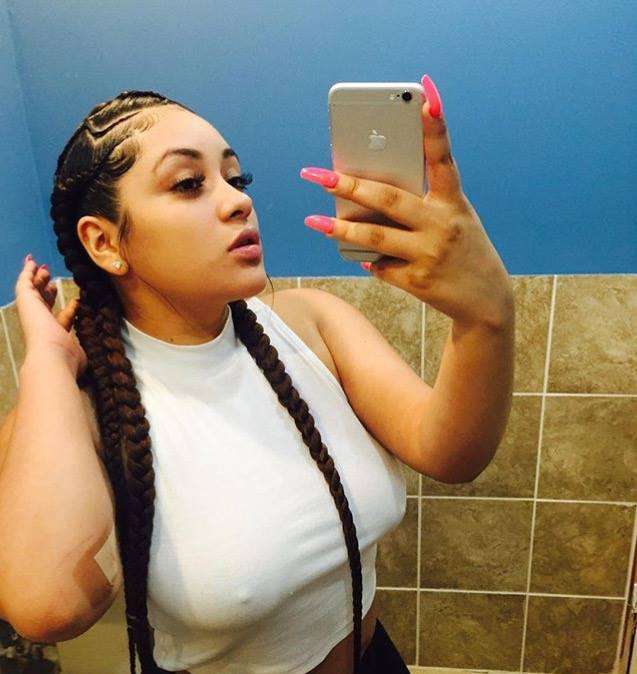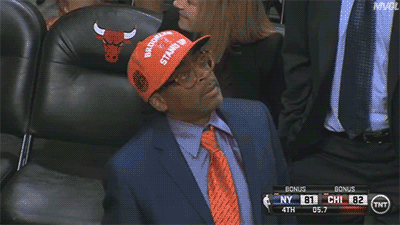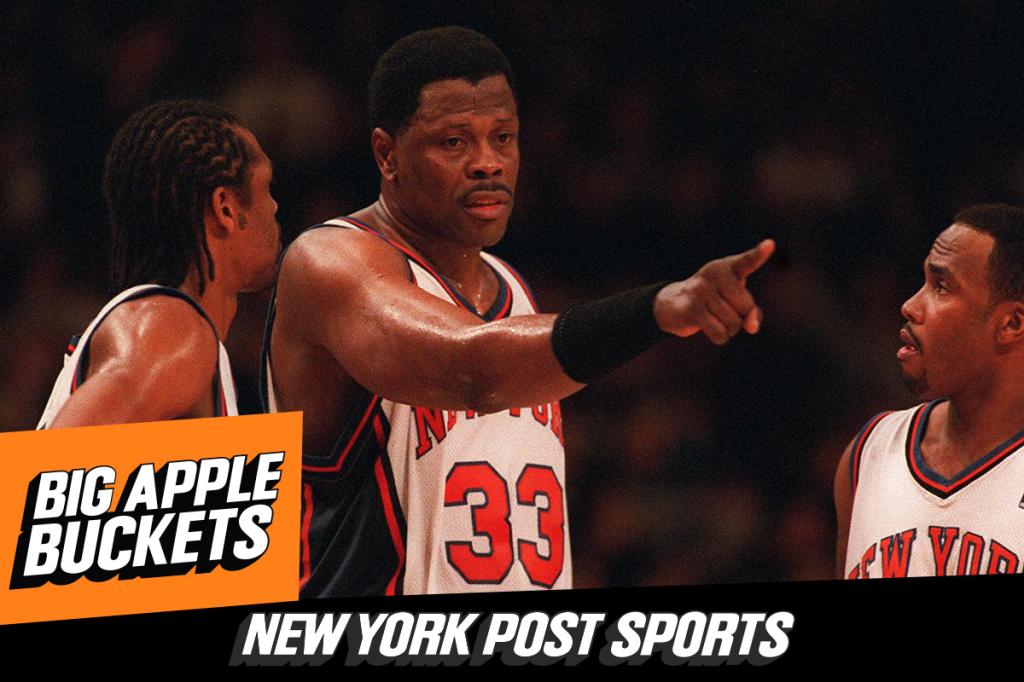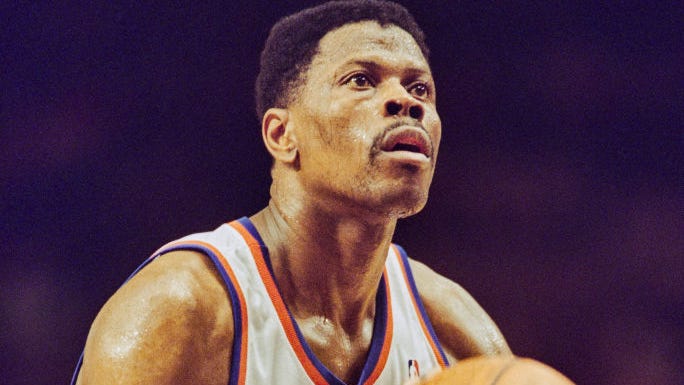How the Knicks stupidly broke up with Patrick Ewing
By Jason Clinkscales | Last updated 2/12/17
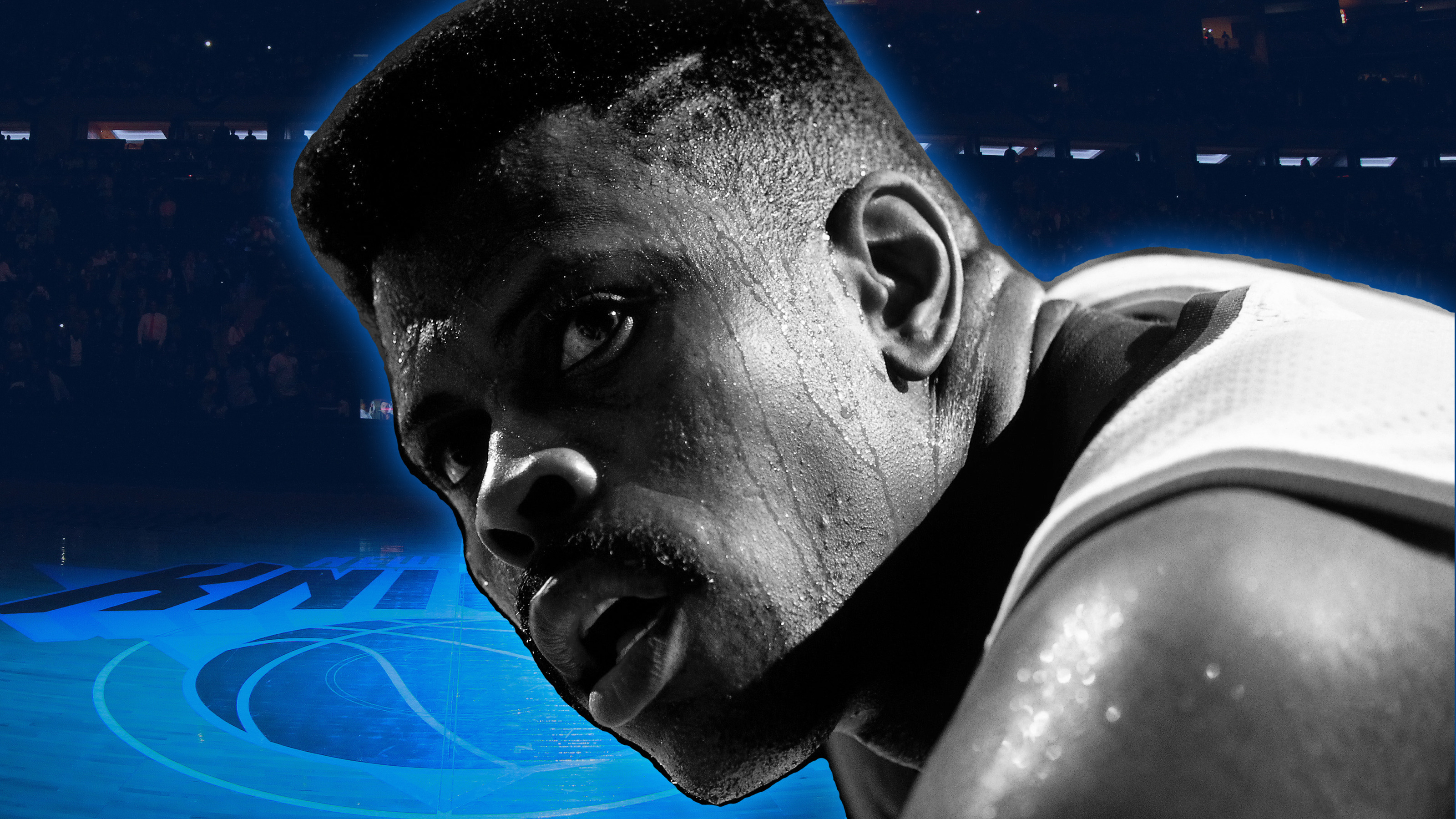
Getty Images/Yardbarker Illustration
Charles Oakley is pretty much The People’s Enforcer right now when it comes to fans of the New York Knicks. His present assignment, if you will, is defending the anger of the fan base while being the protagonist in one of the most galvanizing, yet embarrassing episodes in the 70-year history of the franchise. The #FreeOakley campaign didn’t take long to form, but when team owner James Dolan doubled down on his indignation after the Oakley incident, the former power forward became a rallying point for more than Knicks fans, but fans around the NBA, basketball media and even some of the league’s current stars.
It’s fascinating that the enforcer is being deified – rightfully, of course – by the fan base right now. While this is far from the case with all of the Knicks’ faithful, there has always been a loud, perfect for media fodder contingent that has always targeted a player for more than his performance, but for the sins of management. For ten years, Oakley was the protector for a guy who wasn’t exactly soft himself, but was often that very target when the team fell short of championship aspirations. That player was arguably the greatest to ever wear a Knicks uniform, Hall of Fame center Patrick Ewing.
You may know a decent part of the story right now, one written by a frozen envelope conspiracy, promises to bring championships to a basketball town starved for one and whole lot of chapters that ended with “Michael Jordan got in the way.” Ewing spent 15 seasons of his Hall of Fame career in the blue, white and orange, averaging 22.8 points, 10.4 rebounds, 2.7 blocks, two assists and a steal per game as a Knick. Once the ‘Hoya Destroya’ of some legendary Georgetown teams, Ewing came to New York with the hope of becoming the next great big man to collect MVP trophies and NBA titles.
Yet, as Jordan and the Chicago Bulls would often impede the Knicks from their championship path, there were plenty of internal flaws that kept Ewing from bringing the first title back to New York since 1973. Viacom, who bought the Knicks’ owner Paramount Pictures in 1993, sold the franchise to ITT and Cablevision a year later, setting off a bizarre set of circumstances. Though there was a 50/50 split of ownership between both companies, it was James Dolan, son of the Cablevision founder Charles, who stubbornly steered the ship in hopes of forging his own business path with his inherited riches. Dolan more or less acts as like the villainous business tycoon in your favorite cartoons, so when he took over the Knicks, internal strife over the roster began to come to light in public. Unhappy with the new ownership and losing a power struggle with management after reaching the 1994 NBA Finals, Pat Riley infamously faxed his resignation after the 1994-95 season and announced his departure for the Miami Heat (getting a 10% ownership stake in the process).
Despite carrying the Knicks into the ‘94 Finals – and playing incredibly well in the last truly close series between Hall of Fame centers on that stage – Ewing was somewhat a marked man from that point on. Hakeem Olajuwon’s block of John Starks’ title-clinching attempt at the end of Game 6 and Starks’ infamous ‘2-for-17’ in Game 7 weren’t Ewing’s fault by any means, but you’d be hard pressed to not see how the division between fans and management would have led to his ticket out of town.
Whereas Riley had a great affinity for Ewing, his replacement Don Nelson didn’t share the same fondness, wanting to trade Ewing in hopes of potentially landing Shaquille O’Neal as a free agent the following summer. On top of that, despite already being a contending veteran team, “Nellie-ball” didn’t mesh with a roster that relied on strong defense or Ewing’s offensive game. Nelson was fired quickly, replaced by Jeff Van Gundy after just 59 games.
A constant stream of trades surrounded Ewing made people wonder if it the Knicks would have been better served actually taking Nelson’s advice. Even though a hastily rebuilt roster miraculously made the 1999 NBA Finals as the eighth seed, Ewing’s injuries and his usage on the court made him the scapegoat for so many of the Knicks’ shortcomings.
It had been said for years that Ewing himself gave the green light for the three-team deal that sent him to Seattle before the 2000-01 season, with the Big Fella himself eventually confirming it a few years ago. In retrospect, you could understand why it happened, even if it didn’t make sense. Acrimonious relationships with hyper-critical team executives, fans and media took their toll on him. Putting the city’s true sports unifier – title teams in baseball, football and hockey pale in comparison to a contending Knicks team – on his back for fifteen years of under-appreciation and poor roster decisions would make anyone wonder if the headaches are worth it.
What made the inevitable breakup even worse in retrospect was that it essentially spawned the toxic environment that exists today. Growing up in this city, the divide between Ewing’s critics and supporters was arguably as wide back then as the present day crevasse that grows under the feet of Carmelo Anthony. There are glaring similarities in how both men have handled unrelenting trade rumors, how they are apparently holding back the development of younger players and the belief that neither was willing to put the team over their own selfish desires.
Regardless, just as there will be if Anthony is traded out of New York, there were only two ways to feel about the Ewing trade. The loudest and most soundbite-friendly side said “good riddance” at first, not realizing how shortsighted it was to not just let the remaining season in Ewing’s contract run out, effectively recouping salary cap space for the following offseason. The quieter and more nuanced lamented the 15 years of Ewing sweat – not kidding, Ewing sweat was a phenomenon like no other – and wondered how it got to that point.
Either way, it took a few things for Ewing’s detractors to appreciate his years for the Knicks. One, the team itself basically spent about a decade trading that final year of his contract to disastrous results. Two, a star-studded jersey retirement ceremony in 2003 forced everyone to realize that he was every bit of the player his opponents revered and respected for nearly two decades. Three, the insanity of this year under the watch of Phil Jackson is reminiscent of the 2000s, the worst full decade in franchise history in and out of Madison Square Garden. It's when Hall of Fame coaches flamed out and screwed up. It's when Isiah Thomas became one of the worst executives of all time. It's when expensive contracts kept coming in as drafted talents kept going out.
In his time, Patrick Ewing became the most unappreciated sports figure in the history of New York sports. With an effective post game with great jump-shooting prowess for a big man, he was never credited for adjusting his game as knee injuries began to take their toll. He embodied that blue-collar ethic that the moneyed white-collared fans at the Garden wanted for themselves. Most of all, he was the only relative calm in the early years of the James Dolan regime. Every coach and teammate knew what they were getting from the Big Fella, no matter what chaos surrounded the Knicks. Fans, the media and management eventually realized it, too, but many years too late.
http://www.yardbarker.com/nba/artic...roke_up_with_patrick_ewing/s1_13132_23219515#
By Jason Clinkscales | Last updated 2/12/17

Getty Images/Yardbarker Illustration
Charles Oakley is pretty much The People’s Enforcer right now when it comes to fans of the New York Knicks. His present assignment, if you will, is defending the anger of the fan base while being the protagonist in one of the most galvanizing, yet embarrassing episodes in the 70-year history of the franchise. The #FreeOakley campaign didn’t take long to form, but when team owner James Dolan doubled down on his indignation after the Oakley incident, the former power forward became a rallying point for more than Knicks fans, but fans around the NBA, basketball media and even some of the league’s current stars.
It’s fascinating that the enforcer is being deified – rightfully, of course – by the fan base right now. While this is far from the case with all of the Knicks’ faithful, there has always been a loud, perfect for media fodder contingent that has always targeted a player for more than his performance, but for the sins of management. For ten years, Oakley was the protector for a guy who wasn’t exactly soft himself, but was often that very target when the team fell short of championship aspirations. That player was arguably the greatest to ever wear a Knicks uniform, Hall of Fame center Patrick Ewing.
You may know a decent part of the story right now, one written by a frozen envelope conspiracy, promises to bring championships to a basketball town starved for one and whole lot of chapters that ended with “Michael Jordan got in the way.” Ewing spent 15 seasons of his Hall of Fame career in the blue, white and orange, averaging 22.8 points, 10.4 rebounds, 2.7 blocks, two assists and a steal per game as a Knick. Once the ‘Hoya Destroya’ of some legendary Georgetown teams, Ewing came to New York with the hope of becoming the next great big man to collect MVP trophies and NBA titles.
Yet, as Jordan and the Chicago Bulls would often impede the Knicks from their championship path, there were plenty of internal flaws that kept Ewing from bringing the first title back to New York since 1973. Viacom, who bought the Knicks’ owner Paramount Pictures in 1993, sold the franchise to ITT and Cablevision a year later, setting off a bizarre set of circumstances. Though there was a 50/50 split of ownership between both companies, it was James Dolan, son of the Cablevision founder Charles, who stubbornly steered the ship in hopes of forging his own business path with his inherited riches. Dolan more or less acts as like the villainous business tycoon in your favorite cartoons, so when he took over the Knicks, internal strife over the roster began to come to light in public. Unhappy with the new ownership and losing a power struggle with management after reaching the 1994 NBA Finals, Pat Riley infamously faxed his resignation after the 1994-95 season and announced his departure for the Miami Heat (getting a 10% ownership stake in the process).
Despite carrying the Knicks into the ‘94 Finals – and playing incredibly well in the last truly close series between Hall of Fame centers on that stage – Ewing was somewhat a marked man from that point on. Hakeem Olajuwon’s block of John Starks’ title-clinching attempt at the end of Game 6 and Starks’ infamous ‘2-for-17’ in Game 7 weren’t Ewing’s fault by any means, but you’d be hard pressed to not see how the division between fans and management would have led to his ticket out of town.
Whereas Riley had a great affinity for Ewing, his replacement Don Nelson didn’t share the same fondness, wanting to trade Ewing in hopes of potentially landing Shaquille O’Neal as a free agent the following summer. On top of that, despite already being a contending veteran team, “Nellie-ball” didn’t mesh with a roster that relied on strong defense or Ewing’s offensive game. Nelson was fired quickly, replaced by Jeff Van Gundy after just 59 games.
A constant stream of trades surrounded Ewing made people wonder if it the Knicks would have been better served actually taking Nelson’s advice. Even though a hastily rebuilt roster miraculously made the 1999 NBA Finals as the eighth seed, Ewing’s injuries and his usage on the court made him the scapegoat for so many of the Knicks’ shortcomings.
It had been said for years that Ewing himself gave the green light for the three-team deal that sent him to Seattle before the 2000-01 season, with the Big Fella himself eventually confirming it a few years ago. In retrospect, you could understand why it happened, even if it didn’t make sense. Acrimonious relationships with hyper-critical team executives, fans and media took their toll on him. Putting the city’s true sports unifier – title teams in baseball, football and hockey pale in comparison to a contending Knicks team – on his back for fifteen years of under-appreciation and poor roster decisions would make anyone wonder if the headaches are worth it.
What made the inevitable breakup even worse in retrospect was that it essentially spawned the toxic environment that exists today. Growing up in this city, the divide between Ewing’s critics and supporters was arguably as wide back then as the present day crevasse that grows under the feet of Carmelo Anthony. There are glaring similarities in how both men have handled unrelenting trade rumors, how they are apparently holding back the development of younger players and the belief that neither was willing to put the team over their own selfish desires.
Regardless, just as there will be if Anthony is traded out of New York, there were only two ways to feel about the Ewing trade. The loudest and most soundbite-friendly side said “good riddance” at first, not realizing how shortsighted it was to not just let the remaining season in Ewing’s contract run out, effectively recouping salary cap space for the following offseason. The quieter and more nuanced lamented the 15 years of Ewing sweat – not kidding, Ewing sweat was a phenomenon like no other – and wondered how it got to that point.
Either way, it took a few things for Ewing’s detractors to appreciate his years for the Knicks. One, the team itself basically spent about a decade trading that final year of his contract to disastrous results. Two, a star-studded jersey retirement ceremony in 2003 forced everyone to realize that he was every bit of the player his opponents revered and respected for nearly two decades. Three, the insanity of this year under the watch of Phil Jackson is reminiscent of the 2000s, the worst full decade in franchise history in and out of Madison Square Garden. It's when Hall of Fame coaches flamed out and screwed up. It's when Isiah Thomas became one of the worst executives of all time. It's when expensive contracts kept coming in as drafted talents kept going out.
In his time, Patrick Ewing became the most unappreciated sports figure in the history of New York sports. With an effective post game with great jump-shooting prowess for a big man, he was never credited for adjusting his game as knee injuries began to take their toll. He embodied that blue-collar ethic that the moneyed white-collared fans at the Garden wanted for themselves. Most of all, he was the only relative calm in the early years of the James Dolan regime. Every coach and teammate knew what they were getting from the Big Fella, no matter what chaos surrounded the Knicks. Fans, the media and management eventually realized it, too, but many years too late.
http://www.yardbarker.com/nba/artic...roke_up_with_patrick_ewing/s1_13132_23219515#


